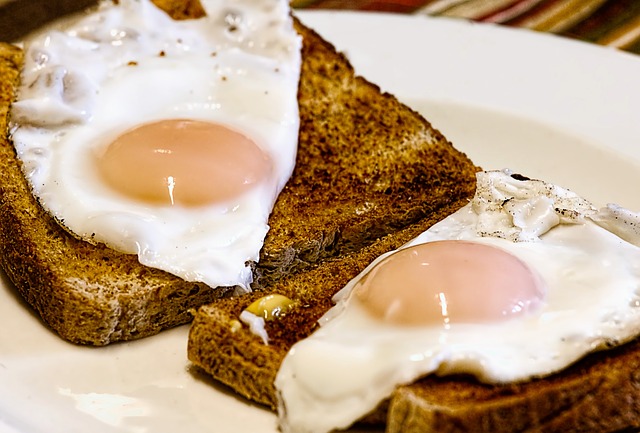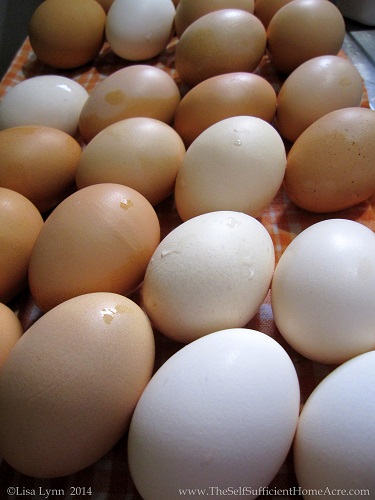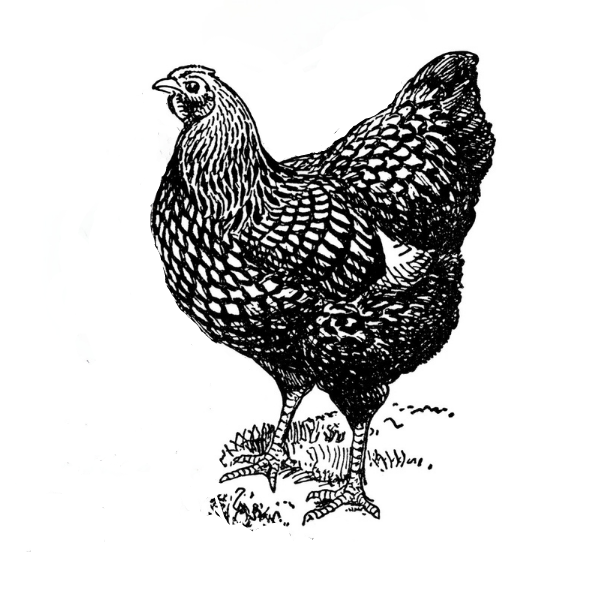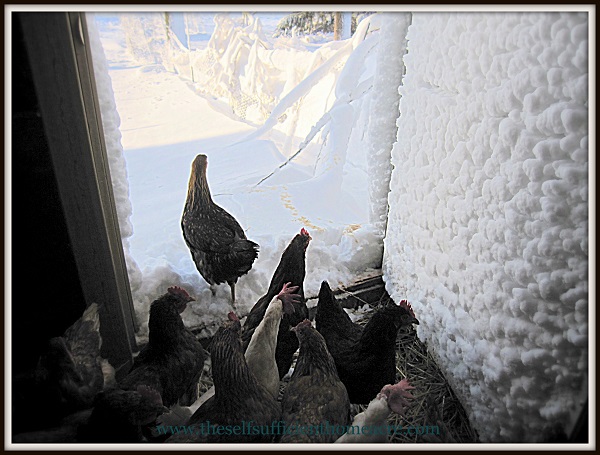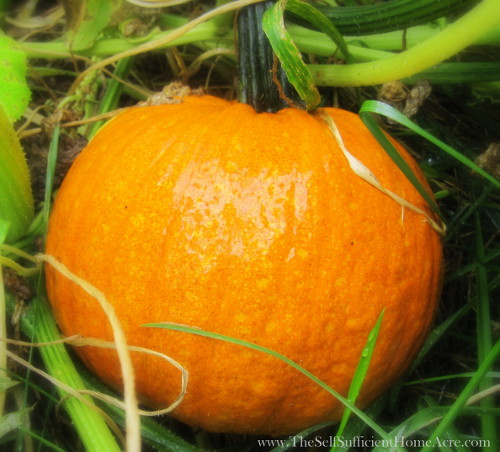Best Winter Treats to Boost Egg Production in Laying Hens
We all love to give our chickens treats to keep them happy and train them to come running when we call. They enjoy a wide variety of goodies and supplemental feed but it’s important to choose the best ones. In summer we need to be careful not to overfeed chickens with fatty treats that can raise their body heat. During cold winter weather, you’ll want to give them extra calories and nutrients to keep them healthy and in good laying condition. So let’s take a look at the best winter treats to boost egg production in your laying hens.
This post contains affiliate links or advertisements as a means for this website to earn income. As an Amazon, LLC affiliate, I earn a commission on qualified purchases made through these links.
Here are a few simple things to keep in mind when giving goodies to your chickens in the winter:
- Chickens need more calories and fat in winter vs summer
- Too many treats can cause hens to lay eggs with thin shells or become too obese to lay eggs at all
- Hens need foods rich in lutein, like fresh veggies, for the most colorful egg yolks
- Feed hens a balanced layer ration to supply at least 90% of their diet
- Supply calcium-rich snacks in the afternoon (all year round) for strong eggshells the next day
Try raising treats for chickens with Mary’s Heirloom Seeds Poultry Garden Combo Pack!
Winter Treats for More Eggs from Your Laying Hens
Keeping a balance between feeding your hens their layer rations and a few treats is especially important for winter egg production. In the summer, hens are usually in their prime laying condition. Pastured hens will have tidbits of protein from the insects and worms they scratch up. Their eggs have rich, nutritious yolks with a deep gold color from eating grass and weeds. Pastured eggs have more vitamins A and E, as well as omega-3. In the winter, your hens may not have access to pasture and green grass and the egg yolks become pale yellow.
To continue serving up those nutritious pastured eggs in winter, try supplementing their layer rations with colorful treats. Another option is to feed your hens a brand with marigold extract added for golden egg yolks. Additional Vitamin A and E, and omega-3 are available in a variety of chicken treats to boost the nutrition of your farm fresh eggs.
Try Manna Pro Omega Egg Maker for healthy egg production!
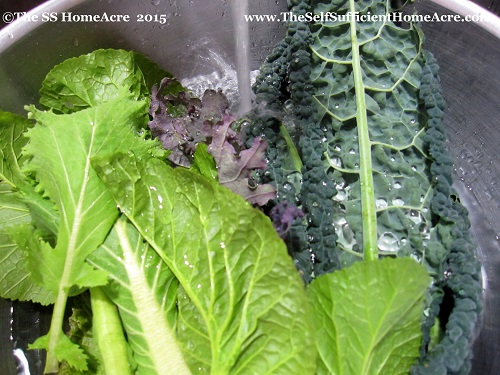
Boost Hen Health, Egg Production, and Nutritional Content with These Treats
Let’s take a look at some of the best treats for boosting egg nutrition and production in your layings this winter. Keep in mind that all of the treats given to your hens each day should not exceed 10% of their diet, to keep them healthy. (Some supplements should be given in small amounts to prevent health issues and are noted, below.)
- Corn – provides body heat in winter, feed a few kernels in the pm to keep them warm overnight
- Whole grain pasta, cooked – provides carbs for energy on cold days (about 1/2 cup per 6 hens, once or twice a week)
- Sunflower seeds – provide protein for maintaining muscle mass and fat for body heat
- Mealworms – provide protein for maintaining muscle mass and methionine for egg production
- Grubbies – provide protein and calcium for egg production
- Pumpkin, kale, broccoli, cabbage, wheatgrass, and greens – provide vitamins and minerals, including calcium for strong eggshells and beta-carotene for deep gold yolks (Free choice)
- Yogurt, cottage cheese, and milk kefir – provide protein, calcium, and probiotics (up to 1 tablespoon/day/hen)
- Scrambled or boiled eggs – provide protein, omega-3, and plenty of vitamins and minerals to help sick or underweight chickens get healthy again
- Apple cider vinegar – provides probiotics for a healthy digestive system (add about 1 tablespoon per gallon of water)
- Probiotics – keep the chicken’s digestive system functioning properly, reducing feed waste while increasing their health
- Flax seed, fish scraps, or safflower oil – boosts the omega-3 content of eggs (about 1 teaspoon of flax seed or safflower oil and a tablespoon or so of fish scraps)
- Kelp meal – provides a wide variety of vitamins and minerals, and helps boost yolk color (up to a teaspoon/day/hen – too much can cause a fishy odor in eggs)
- Eggshells – provide calcium and other minerals for the production of eggs with strong shells (dry, crush, and sprinkle over feed if your hens are laying eggs with thin shells)
- Cayenne pepper – helps increase circulation, and boosts beta carotene in eggs (about 1 teaspoon/day/hen)
- Cinnamon – aids digestion and improves general health and resistance to parasites (about 1/2 teaspoon/hen/day – too much thins the blood and can cause digestive issues)
- Turmeric – reduces inflammation, boosts the immune system, and increases the gold color of egg yolks (about 1/4 teaspoon/hen/day – too much thins the blood and can cause clotting issues)
- Garlic – natural parasite preventative, immune system booster, and appetite stimulant (1/4 teaspoon/hen/day is plenty and shouldn’t cause their eggs to take on a garlicky flavor)
Boost Egg Production and Quality In Winter
There are several things you can do to get more eggs of a higher quality in cold winter weather. In addition to giving your hens the best treats for egg production, you should also:
- Set a bright light to come on early every morning to provide at least 15 hours of ‘daylight’ per day
- Feed your hens a fresh (ideally, no more than a month old), balanced layer ration to supply at least 90% of their diet
- Keep their water clean and thawed so they can drink as needed
- Give treats in moderation to supplement their diet, as discussed in this article
- Prevent cold drafts or a buildup of ammonia in their coop
- Supply a dish of crushed oyster shells and a separate dish of poultry grit, free choice
- Prevent stress, feather-picking, vent-pecking, or cannabilism in your flock with a proper diet and additional mealworms or another source of methionine in their diet (layer rations should be fortified with this nutrient needed for egg production)
- Protect chickens’ feet, combs, and wattles with a thin coat of petroleum-free jelly to prevent frostbite (don’t get this ointment on their feathers as this will ruin their natural insulation)
When you’ve provided these helpful conditions for your flock, they’ll be healthy and happy over the winter. Plus, with a few extra treats to supply the nutrients they need, you’ll collect rich, tasty eggs all winter long!
Keep in mind that each year your hens will go through a molt to replace their feathers. Some chicken keepers choose to give their hens a beak from laying over winter, instead of putting a light on a timer for egg production. That is totally fine and your hens may go through their molt over the winter, too. In the spring, they’ll start laying lovely eggs with nice hard shells after their break! As they age, hens also lay fewer, larger eggs and will eventually cease to lay at all. You may wish to cull your older hens and get the best production from them by keeping a light on in their coop in winter to keep your expenses lower.


